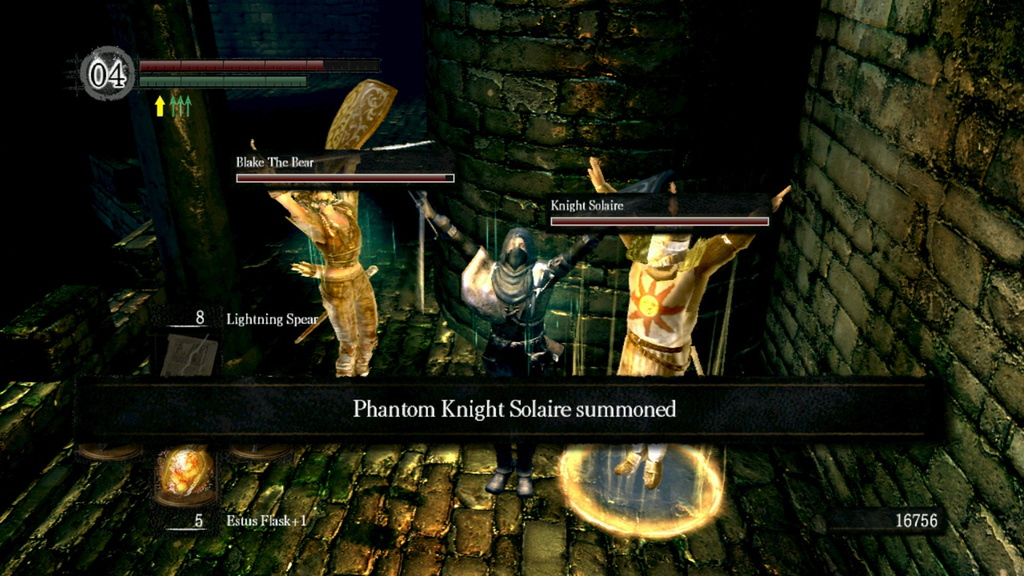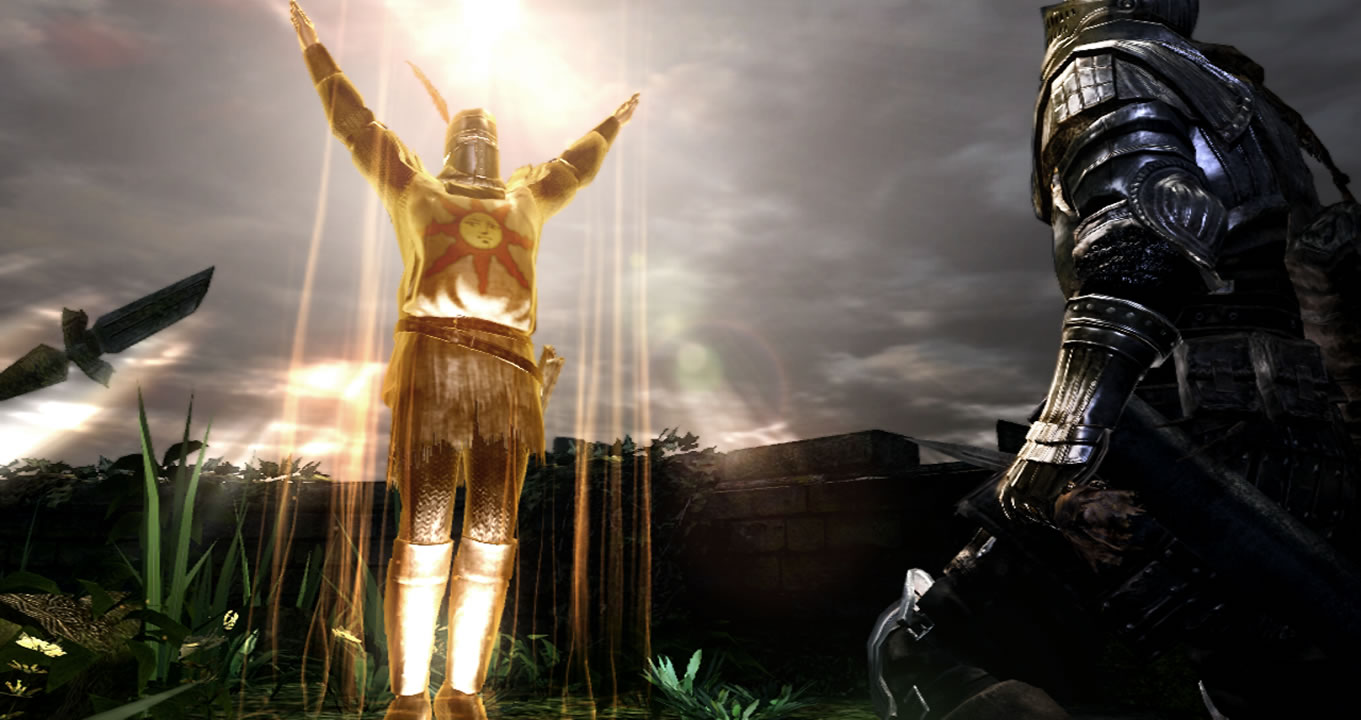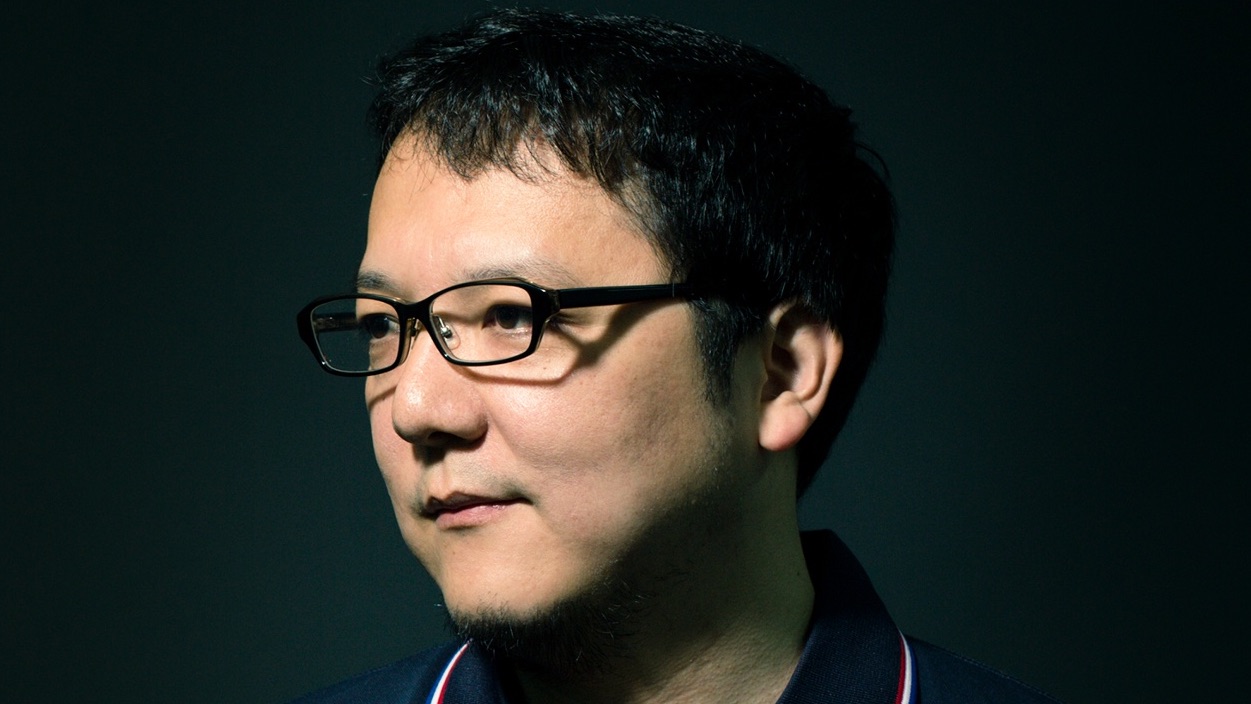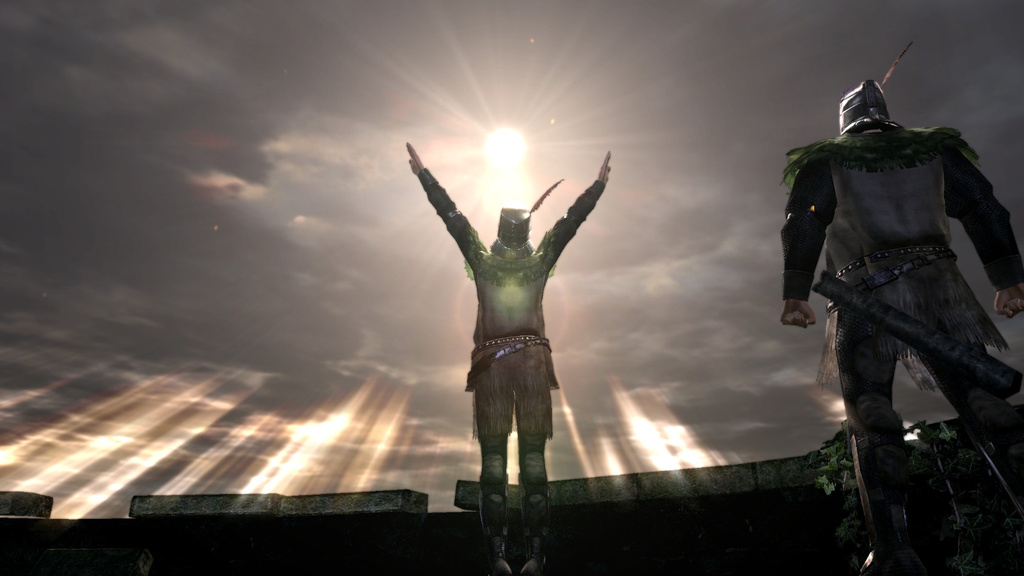Why we praise the sun: the story of Dark Souls' most famous gesture
Without an act of rebellion from Hidetaka Miyazaki, Dark Souls would be without its brilliant mascot.
In games all about the futility of humanity and slow cycles of decay, Dark Souls series director Hidetaka Miyazaki went to incredible lengths just to shine a little light on the same players he punished so severely. How is it that "Praise the sun!" became the phrase most synonymous with such a somber series?
You don’t need to have played Dark Souls to be familiar with praising the sun. Chances are you’ve seen it in an all-caps Reddit comment, scrolled past the ‘praising intensifies’ gif somewhere on Twitter or Facebook, or watched convention-goers praise the sun for photos like it was the new planking. This cultural takeover, the permeation of celebration through a game that intentionally restricts communication, is all according to Miyazaki’s grand design—and it began long before the kindling of the first flame.
Early light
Demon’s Souls was the foundation for the mechanics that we now think of as the souls-like genre—abstract multiplayer, maddeningly opaque lore, and soul-crushing difficulty. It’s commonly considered Hidetaka Miyazaki’s original creation that led to its popular Dark Souls offspring, but the genre, and the sun gesture with it, might not exist at all without Miyazaki’s rebellious spirit. In a 2015 interview with The Guardian, he explains how he took over the failing project:
“The project had problems and the team had been unable to create a compelling prototype. But when I heard it was a fantasy-action role-playing game, I was excited. I figured if I could find a way to take control of the game, I could turn it into anything I wanted. Best of all, if my ideas failed, nobody would care—it was already a failure.”
Dark Souls went from an obscure Japanese action RPG to a household name among PC gamers, so it's clear how that gamble turned out for Miyazaki. Demon’s Souls was more than just the origins of the souls genre. It was also the birthplace for Miyazaki’s sunlight scheme.
When I presented the game to the rest of the company, I showed them that pose and one of the higher ups told me it just wasn't cool enough. Of course I told him I'd get rid of it but I secretly kept it in the game.
Hidetaka Miyazaki
In Demon’s Souls, praising the sun only makes a guest appearance and isn’t referred to as “praising the sun.” Just like the rest of Dark Souls lore, it’s been there longer than anyone knew to look for it. It’s an uncommon gesture in Demon Souls, used only when a character casts a miracle while wearing the Ring of Sincere Prayer. In the Dark Souls Design Works set of interviews, originally only published in Japanese, Miyazaki explains how the gesture arrived first in Demon’s Souls and later in Dark Souls:
"That pose actually carries some significance for me. During Demon’s Souls, that was a holy sign. When I presented the game to the rest of the company, I showed them that pose and one of the higher ups told me it just wasn't cool enough. Of course I told him I'd get rid of it but I secretly kept it in the game. So naturally, with [Dark Souls] I was determined to use it."
Keep up to date with the most important stories and the best deals, as picked by the PC Gamer team.
After successfully smuggling the pose into Demon’s Souls, Miyazaki was determined to bring it with him to Dark Souls. To spread his holy message, he needed a prophet. Thus, the Warriors of Sunlight were born.
Father sun
Up to this point, praising the sun had been met with little recognition. It existed in Demon’s Souls only as contraband, going mostly unnoticed. Miyazaki knew that his movement would need a champion in order to survive.
Source: ThePruld on YouTube
Solaire is the first Warrior of Sunlight that the player meets several hours into Dark Souls. Up until running into him in the Undead Parish, you’ve been beaten up, beaten down, and mocked by environment and NPC alike for the curiosity that other games used to laud you for. Solaire, by contrast, immediately offers to help you. He can be summoned as a companion during the next boss fight and several others throughout the game. He’s a consistent presence of support and friendship throughout an otherwise lonely journey.
When asked why they praise the sun in a Reddit thread, MightySquidWarrior gave the following interpretation:
"Without waxing too poetic about my man-crush for Knight Solaire, let me just point out that he is the first person players encounter who is truly nice to us for no reason other than that he is a friendly fellow. At this point, we've been beaten down so many times we think everything that moves in the game is out to kill us, so encountering an outright helpful NPC is shocking. In our joy, we praise the sun."

Unexpected kindness or silliness is the common theme in just about anything that becomes popular in the Dark Souls community. Dressing up as an NPC when invaded became a fad thanks to the hiding in plain sight video. The Fashion Police had a moment to shine after a theatrical retelling of an encounter cropped up on Reddit. In a series that routinely builds players up just for the sadism of knocking them back down again, every little ray of sunshine is a victory worthy of praise. Solaire, as MightySquidWarrior explained, is arguably the first such ray of sunshine that players of the original Dark Souls ever experienced. It’s a memorable moment that fiercely endears players to Solaire.
Sun language
Miyazaki gave created Solaire of Astora, the grossly incandescent Warrior of Sunlight, knowing full-well the impression he would leave on players. Even so, that alone would not have been enough to raise everyone's hands in sun-praising. Miyazaki's methods are more subtle than that.
Gestures are indispensable in Dark Souls. The entire game fundamentally restricts communication. You play a voiceless character who can often only interact with NPCs by gesturing or attacking. When it comes to multiplayer, the lack of both voice and text communication leaves you similarly hamstrung. To communicate with others, friend and foe alike, gestures became a dialect of their own. It became customary to bow before fighting a hostile player invader. It only made sense to give a good “hurrah” or jump with joy after a particularly difficult fight. You may even prostrate yourself if things are looking particularly dire. Then, after joining Solaire’s Warriors of Sunlight covenant later in the game—and who wouldn’t—you’re gifted a glorious new gesture. You can now praise the sun.
The beauty of praising the sun is that it has no baked-in meaning. Waving and bowing and pointing all have obvious uses based on real-world application. Before putting the gesture into players’ hands, throwing your arms up in the air with your palms out while standing tiptoed could have meant anything, but it's a unique gesture that only looks like a person preparing to swan dive or somehow take off flying.
Praising the sun was an opportunity for players to place their own meaning on the game world, rather than continue to excavate its vague item descriptions and cryptic cut scenes for scraps of information. In a series so bent on kicking the player while they're down, on dragging them through a broken record of humanity's greatest failures, it's a fun, hopeful gesture that rises to the top.
So with Solaire as their inspiration, everyone came to a collective, gradual decision on the meaning of praising the sun. It would be a sign of joy, hope, and jolly cooperation.

Lauren has been writing for PC Gamer since she went hunting for the cryptid Dark Souls fashion police in 2017. She joined the PCG staff in 2021, now serving as self-appointed chief cozy games and farmlife sim enjoyer. Her career originally began in game development and she remains fascinated by how games tick in the modding and speedrunning scenes. She likes long fantasy books, longer RPGs, can't stop playing co-op survival crafting games, and has spent a number of hours she refuses to count building houses in The Sims games for over 20 years.




